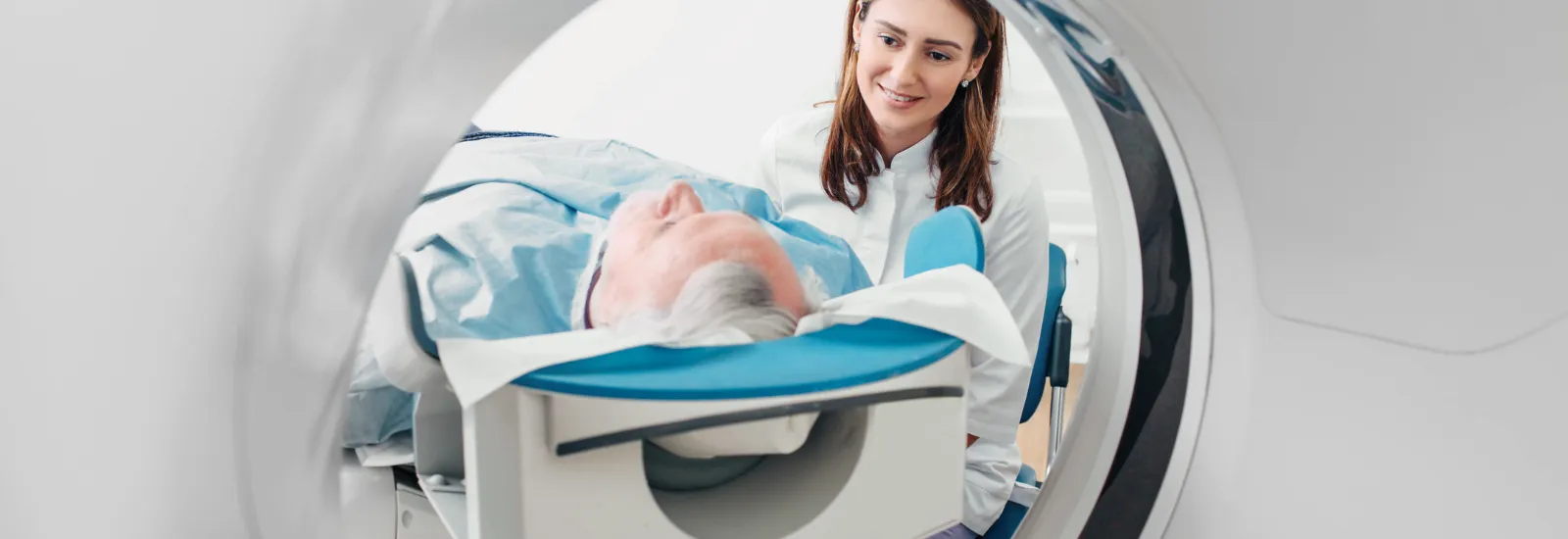
How a cardiac CT scan can assess your risk for heart disease
4-minute read
A cardiac computed tomography (CT) test uses advanced computer
equipment to create high-resolution images of your heart and blood vessels.
This is a noninvasive imaging procedure and can take place in an outpatient
setting. Learn more about what to expect if you need a cardiac CT scan.
What is the purpose of a cardiac
CT test?
The coronary arteries supply blood to the heart. Over time,
plaque can build up in these arteries and limit blood flow. Plaque contains
fat, calcium, and other substances. Extensive plaque buildup can lead to
coronary artery disease.
Your cardiologist may recommend a cardiac CT scan if you
have symptoms of heart disease, such as recurring chest pain. The test can
check for narrowing, blockages, or plaque buildup in the arteries. You may also
need a CT scan before or after heart surgery. The two types of cardiac CT tests
include:
- CT calcium score: This
test involves using X-ray technology to see if the plaque buildup is causing
narrowing or blockage in the coronary arteries,
which may suggest coronary artery disease.
- CT angiography: Clinicians
inject contrast material into your blood vessels and then perform a CT scan to
view the vascular system and guide their diagnosis.
How to prepare for a heart CT
scan
A cardiac CT calcium score requires practically no preparation,
and you won't need a referral from your provider. However, a CT angiography
test will need to be ordered by your physician and you will be provided with a
list of instructions to follow. You may need to fast for a few hours before the
test for the contrast dye to work effectively.
General guidelines may include avoiding caffeine and certain
medications beforehand. Make sure your provider has a complete list of all
supplements, prescriptions, and over-the-counter medications you're taking.
They may also give you medicine to slow your heart rate, which will improve the
quality of the images.
What to expect at your
appointment
On the day of your appointment, remember not to wear
jewelry, as metal objects can affect the imaging process. You will wear a
hospital gown and lie on a table, which will move in and out of the CT scanner.
If you're anxious about the test or get claustrophobic in
tight spaces, you may receive medication to help you stay calm and relaxed
during the procedure. Next, your provider may affix a few small, sticky
electrode patches to your chest that attach to an electrocardiogram (EKG)
monitor, which tracks your heart's activity.
The CT scanner will then generate images of your heart.
You'll need to remain still during the scan so the images are not blurry. You
may be asked to hold your breath for a second or two.
The entire appointment shouldn't take more than an hour.
Then, you can get dressed and return home the same day. If you had sedating
medication, you will need someone to drive you home from your appointment. You
may have a follow-up appointment to discuss your test results with your
provider, or they may contact you via phone.
Understanding your calcium score
Your calcium score
measures the amount of calcium in your coronary arteries on a scale of zero to
400. If your calcium score is zero, you likely do not have coronary artery
disease and your risk for heart attack is low. A high coronary calcium score
indicates evidence of coronary artery disease. Results indicate the following:
- Zero: No evidence of calcification
- One to 10: Minimal calcification
- 11 to 100: Mild calcification
- 101 to 300: Moderate calcification
- 301 to 400: Severe calcification
This score will help inform which medical treatments your
clinician recommends.
Managing your heart disease risk
If your coronary
calcium score is low but still shows calcification, you may benefit from
lifestyle changes to lower your risk. To protect your heart:
- Be active. Routine exercise can lower blood pressure and cholesterol levels, as well as regulate blood sugar. The American Heart Association recommends adults get at least 30 minutes of exercise five days per week.
- Drink less. Occasional alcohol consumption isn't a cause for concern, but drinking too much can lead to high blood pressure, a contributor to heart disease risk.
- Eat a balanced diet. Eating a diet high in saturated and trans fats can contribute to high cholesterol, which left untreated can lead to a buildup of plaque on your artery walls. Choose nutrient-dense, heart-healthy foods, such as leafy greens, fruits, vegetables, whole grains, beans, peas, lentils, fatty fish, low-fat dairy, nuts, and seeds.
- Get enough rest. Make sure you're getting the recommended amount of sleep each night for your age range.
- Kick your tobacco habit if you have one. Quitting smoking significantly reduces your risk for many health problems, including heart disease.
- See your primary care provider (PCP). Diabetes, high blood pressure, and high cholesterol levels are linked to a higher risk of heart disease. Annual checkups allow your PCP to keep tabs on these conditions and help you address them. Your PCP can also give you strategies for managing risk factors you can't control, such as your family history of heart disease.
Patients in East Central Indiana and West Central Ohio have access to a team of experienced cardiologists, vascular surgeons, and imaging specialists at Reid Health. Cardiology care is available at multiple locations. For more information, request an appointment at Reid today.
For information about heart scans and vascular screenings, go to reidhealth.org/screenings.

